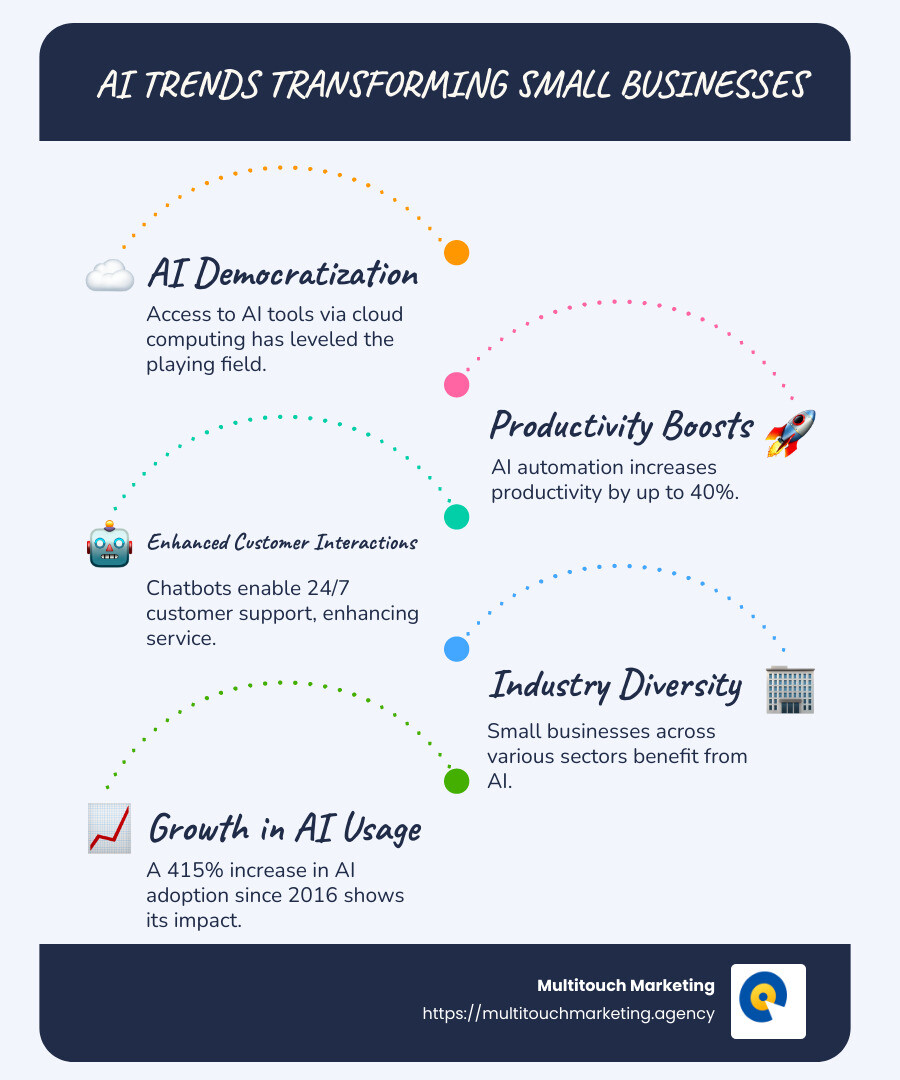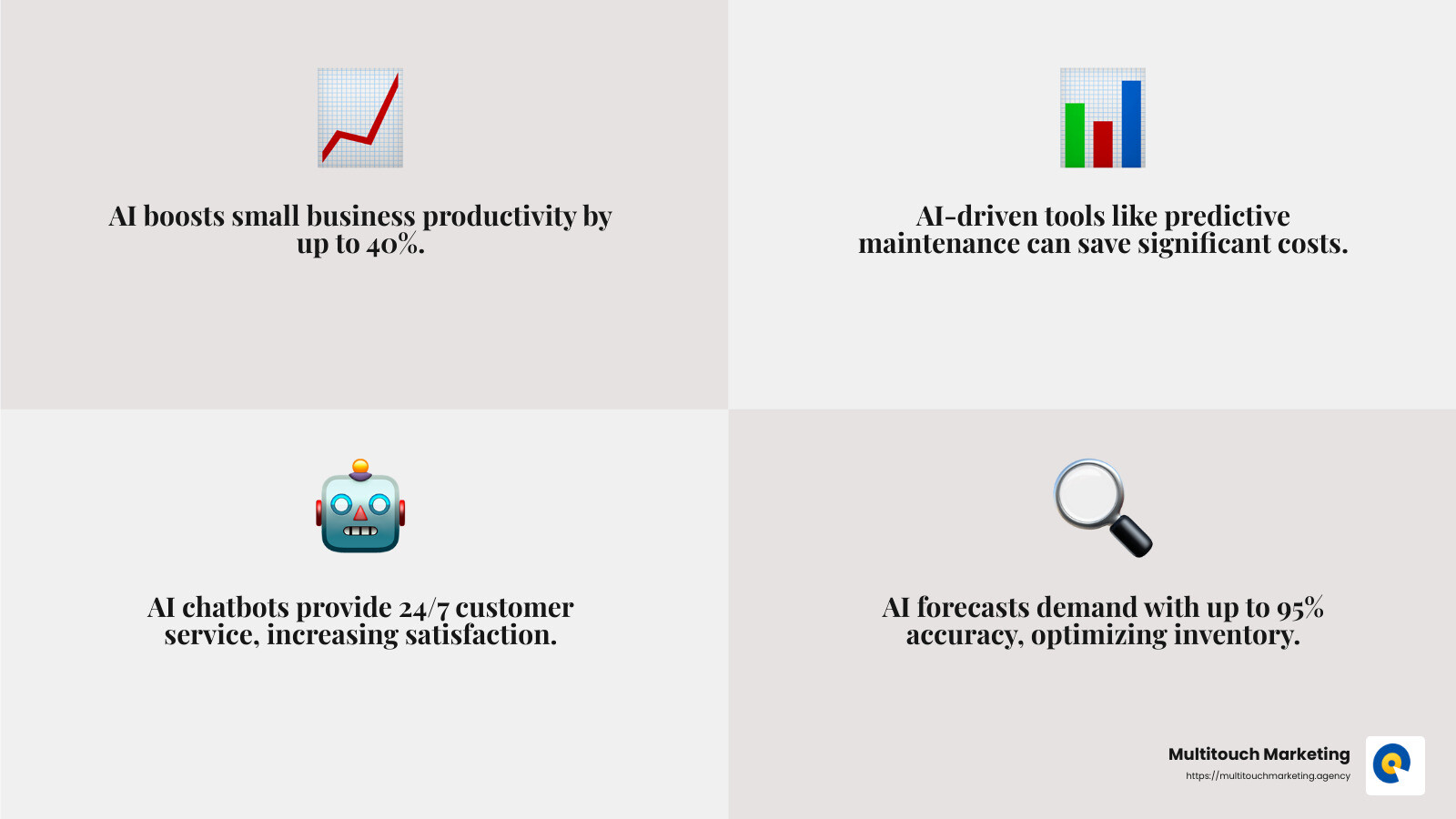AI Trends in Small Business: 5 Surprising Boosts 2025
AI Trends in Small Business are reshaping the landscape in profound ways. A few key trends include:
- AI Democratization: Easier access to AI tools thanks to cloud computing.
- Productivity Boosts: AI automation increases efficiency by up to 40%.
- Improved Customer Interactions: Chatbots offering 24/7 support.
- Industry Diversity: AI is not just for tech giants; small businesses in various sectors are benefiting.
The integration of artificial intelligence into small businesses is not just a buzzword—it’s a game-changer. Once reserved for large corporations, AI is now democratized, meaning that even the smallest of businesses can leverage its powerful tools and platforms. This access levels the playing field, allowing small businesses to grow and compete by enhancing productivity and customer service without a hefty price tag. According to recent studies, small businesses have shown a 415% increase in AI usage since 2016, making it clear that AI is a key driver of growth.
As someone who combines a love for data with cutting-edge AI innovations, I know how AI can transform small businesses. My experience with digital marketing and artificial intelligence has shown me how crucial AI trends are for ensuring that small businesses remain competitive and innovative.
For a visual guide on these trends, check out our infographic below.
AI Trends in Small Business
In today’s world, AI Trends in Small Business are changing how these enterprises operate. Let’s explore some key trends that are making a big impact:
- Boosting Productivity: AI tools are helping small businesses work smarter, not harder. By automating mundane tasks, AI can increase productivity by up to 40%. For instance, AI-powered project management tools like Monday.com can automate scheduling and task allocation, freeing up time for more strategic activities.
- Enhancing Efficiency: Imagine a small bakery that uses AI to predict demand with 95% accuracy, as reported by Accenture. This allows them to manage inventory better and reduce waste. Similarly, AI can optimize delivery routes, saving both time and fuel costs.
- Driving Cost Savings: AI doesn’t just improve efficiency; it also cuts costs. By automating repetitive tasks, businesses can save on labor costs and allocate resources more effectively. Predictive maintenance powered by AI can prevent costly equipment breakdowns, saving money in the long run.
- Improving Customer Service: Customer experience is everything. AI chatbots, like those powered by ManyChat, provide 24/7 customer support, answering queries and handling transactions without human intervention. This leads to higher customer satisfaction and loyalty.
These trends highlight how AI is reshaping the landscape for small businesses, offering tools that were once exclusive to big corporations. With AI, small businesses can not only survive but thrive, gaining a competitive edge in their respective industries.
Next, we’ll explore how AI improves efficiency through automation, inventory management, scheduling, and chatbots.
Enhancing Efficiency with AI
AI is a game-changer for small businesses looking to improve efficiency. Let’s explore how automation, inventory management, scheduling, and chatbots are making a difference.
Automation
Automation is like having an extra set of hands for your business. By automating repetitive tasks, businesses can focus on what truly matters. For example, AI can automate email responses, freeing up time for more critical tasks. This is especially helpful for small businesses with limited staff. According to research, AI can boost productivity by up to 40%, which is a huge win for small businesses.
Inventory Management
Imagine knowing exactly how much stock you need without over-ordering or running out. AI makes this possible. With AI-driven inventory management, businesses can predict demand with high accuracy. For example, a small bakery using AI can reduce waste by forecasting demand accurately, as reported by Accenture. This not only saves money but also ensures customers get what they want when they want it.
Scheduling
Scheduling can be a headache, but AI makes it a breeze. Tools like AI-powered project management platforms can handle scheduling automatically. Whether it’s assigning tasks or setting deadlines, AI ensures everything runs smoothly. This means less time spent on admin work and more time for strategic planning.
Chatbots
Customer service is crucial, and AI chatbots are here to help. Chatbots provide 24/7 support, answering questions and handling transactions without human help. This leads to happier customers and more sales. Tools like ManyChat make it easy for small businesses to implement chatbots, improving customer experience without adding to the workload.
These AI tools are changing how small businesses operate, making them more efficient and competitive. Next, we’ll dig into AI-powered marketing strategies and how they can lift your business.
AI-Powered Marketing Strategies
AI trends in small business marketing are making waves with personalization, targeted campaigns, and deep customer insights. Let’s explore how these trends are changing marketing strategies for small businesses.
Personalization
Imagine sending each customer a message that feels like it was crafted just for them. That’s the power of AI in personalization. Tools like Mailchimp use AI to suggest content custom to individual preferences. This means your emails are more likely to be opened and read, leading to better engagement. According to a Social Shepherd study, personalized marketing can lead to a 20% increase in sales. For small businesses, this can be a game-changer.
Targeted Campaigns
Gone are the days of one-size-fits-all marketing. With AI, small businesses can create highly targeted ad campaigns. Platforms like Facebook Ads use AI to target specific demographics and interests. This ensures your ads reach the right people, maximizing your marketing ROI. A well-targeted campaign can be up to 70% more effective than generic ads, as highlighted in industry reports.
Customer Insights
Understanding your customers is key to a successful business. AI tools provide valuable insights by analyzing customer data and behavior. For instance, AI can predict what products a customer might be interested in based on their past purchases. This allows businesses to tailor their offerings and improve customer satisfaction. As reported by Google AI research, using data-driven insights can boost decision-making accuracy by up to 90%.
These AI-powered marketing strategies are not just for big corporations. They’re accessible and affordable for small businesses too, leveling the playing field and opening new growth opportunities. Next, we’ll explore the challenges small businesses face when adopting AI and how to overcome them.
Overcoming Challenges in AI Adoption
While AI offers exciting opportunities for small businesses, there are problems to jump over. Let’s explore some of the main challenges: affordability, technical expertise, and data privacy.
Affordability
Many small businesses worry about the cost of AI. According to the U.S. Chamber of Commerce, nearly 60% of small businesses see cost as a major barrier when adopting new technologies like AI. However, it’s important to note that while some AI tools are expensive, many affordable options exist. For instance, AI-powered platforms like Monday.com offer free trials, allowing businesses to test the waters before committing financially. Moreover, as AI technology becomes more widespread, prices are expected to drop, making it more accessible for small enterprises.
Technical Expertise
Another challenge is the lack of technical expertise. Small businesses often don’t have the resources to hire specialized staff to manage AI tools. According to research from McKinsey & Company, smaller organizations lag behind larger companies in AI adoption due to resource constraints. However, this doesn’t mean small businesses are left in the dark. Many AI tools are designed with user-friendly interfaces, requiring minimal technical knowledge. Additionally, there are online resources and courses available that can help business owners and employees learn the basics of AI.
Data Privacy
Handling data privacy is crucial when implementing AI. Small businesses may lack the infrastructure to secure large volumes of data, posing risks of data breaches and regulatory non-compliance. This concern is echoed in a survey by the Small Business and Entrepreneurship Council, which emphasizes the importance of data protection. To tackle this, businesses can use AI-powered cybersecurity tools that monitor network traffic and detect unauthorized access attempts. Implementing robust data protection measures ensures compliance with privacy regulations and builds customer trust.
By addressing these challenges head-on, small businesses can harness the power of AI to drive growth and efficiency. Next, we’ll answer some frequently asked questions about AI trends in small business. Stay with us!
Frequently Asked Questions about AI Trends in Small Business
How is AI used in small businesses?
AI is a game-changer for small businesses, helping them tackle various tasks with ease. One popular use is in cybersecurity. AI tools can monitor network traffic and spot unusual activities, keeping data safe from cyber threats. This is crucial because data breaches can be costly and damaging to reputation.
For collaboration, AI tools like chatbots and virtual assistants streamline communication. They handle simple queries, freeing up employees to focus on complex issues. This boosts productivity and improves customer service.
AI also excels in problem-solving. It can analyze vast amounts of data to provide insights, helping businesses make informed decisions. From predicting customer behavior to optimizing marketing strategies, AI tools empower small businesses to stay competitive.
What percentage of small businesses use AI?
AI adoption among small businesses is on the rise. According to the Small Business and Entrepreneurship Council’s 2023 survey, a whopping 83% of small business owners plan to invest in AI in the next year. This shows a growing interest in leveraging AI for business growth.
While larger companies have been quicker to adopt AI, small businesses are catching up. With more affordable and user-friendly AI tools available, the barriers to entry are lowering. This trend is expected to continue as AI becomes an essential part of business operations.
What is the current AI trend?
The buzzword in AI today is generative AI. This technology creates content, from writing to images, using algorithms. It’s revolutionizing industries like marketing and design by automating creative tasks. Businesses use generative AI to produce engaging content quickly, saving time and costs.
Another major trend is how AI is driving business change. Companies are rethinking their strategies to integrate AI into their workflows. This shift is evident across industries, from retail to finance, where AI helps with demand forecasting and fraud detection.
AI’s impact is undeniable, and small businesses are ready to benefit. By staying updated on these trends, they can harness AI’s potential to thrive in a competitive market.
Need Help?
At Multitouch Marketing, we understand the transformative power of AI and its potential to level the playing field for small businesses. As AI trends continue to evolve, they offer small enterprises a unique opportunity to gain a competitive edge.
AI is not just for the tech giants anymore. With tools becoming more affordable and easier to use, small businesses can now harness AI to improve productivity, improve customer service, and reduce costs. This democratization of AI is a game-changer, allowing smaller players to compete with larger corporations.
Looking ahead, the future prospects for small businesses leveraging AI are promising. As more companies incorporate AI into their operations, those who accept these technologies early will likely see significant benefits. From automating routine tasks to gaining valuable insights into customer behavior, AI can drive growth and innovation.
At Multitouch Marketing, we are committed to helping businesses steer this evolving landscape. By staying informed about the latest AI trends and offering expert guidance, we empower our clients to make the most of these technologies. Whether it’s through personalized marketing strategies or efficient PPC campaigns, we ensure that our clients are well-equipped to succeed in the digital age.
In conclusion, AI is reshaping the business world, and small businesses stand to gain immensely. By embracing AI trends, they can not only survive but thrive in an increasingly competitive market. Let us help you open up the full potential of AI for your business growth.



